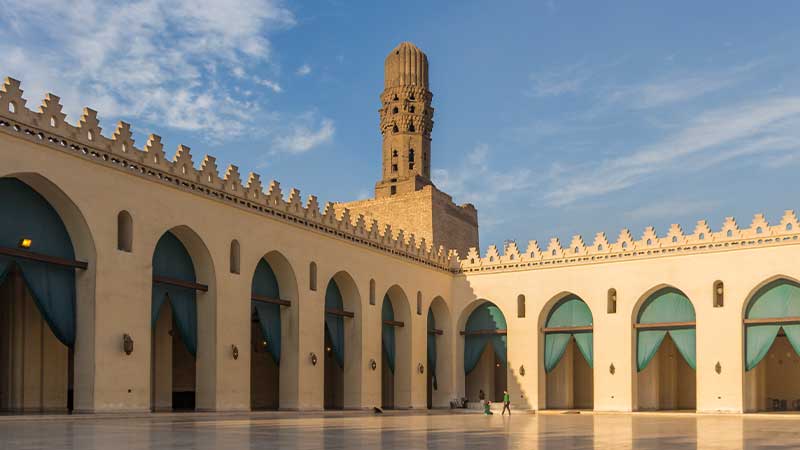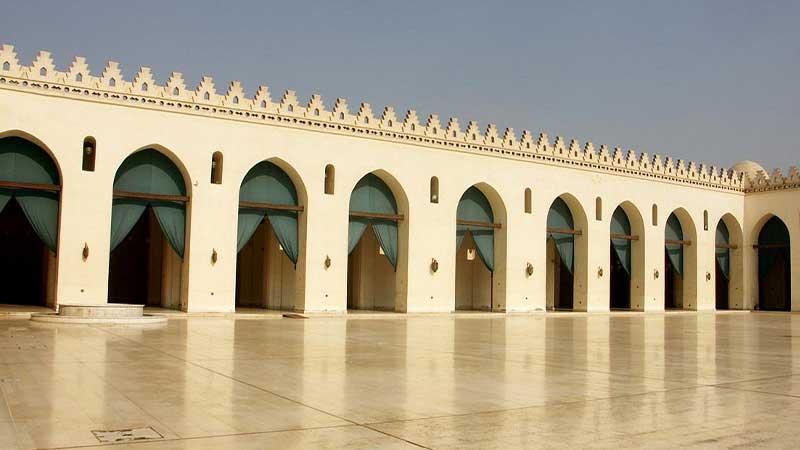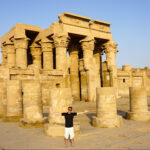In the heart of Cairo, Egypt, stands the remarkable Al Hakim Mosque, an architectural marvel that encapsulates the essence of Islamic culture and spirituality. This awe-inspiring monument is not just a place of worship; it’s a testament to its creators’ ingenuity and artistic prowess. Let’s embark on a journey to unravel the captivating story and profound significance of the Al Hakim Mosque.
Al-Hakim Mosque: A Glimpse into History

Situated in the historic Fatimid Cairo district, the Al Hakim Mosque was erected in the 10th century during the reign of Caliph Al Hakim bi-Amr Allah. Its construction was a labor of devotion, undertaken by skilled artisans and craftsmen who poured their hearts and souls into every intricate detail.
The Architectural Splendor
The Al Hakim Mosque is an architectural masterpiece landmark boasting a harmonious blend of Islamic and Fatimid design elements. Its façade is adorned with intricate geometric patterns, calligraphy, and ornate carvings that reflect the aesthetic brilliance of the era. The imposing minarets and soaring domes create a silhouette that’s nothing short of mesmerizing.
Exploring the Interior
Stepping inside the Al Hakim Mosque, one is enveloped by tranquility and reverence. The prayer hall’s soaring ceilings, embellished with delicate stucco work, evoke a feeling of awe and insignificance—a reminder of the vastness of the divine. The mihrab, adorned with intricate Quranic verses, is a focal point for worshippers.
Cultural Significance and Spiritual Haven
Beyond its grandeur, the Al-Hakim Mosque holds immense cultural and spiritual significance. It has served as a center for Islamic learning, a place of community gatherings, and a sanctuary for seekers of solace. The mosque’s courtyard, shaded by ancient trees, offers a serene space for reflection and contemplation.
Al Hakim Mosque: Legends and Lore

Legends and stories shroud the Al Hakim Mosque in mystique. One intriguing tale attributes its construction to divine intervention, narrating how the caliph received a divine command to erect the mosque. Whether rooted in fact or folklore, these narratives add to the mosque’s allure and enigmatic aura.
The Enchanting Call to Prayer
As the sun sets over Cairo, the Al Hakim Mosque comes alive with the hauntingly beautiful call to prayer. The melodious Adhan, echoing through the minarets, serves as a poignant reminder of the mosque’s role in connecting the earthly with the divine—a call that has resonated for centuries.
Architectural Symbolism Unveiled
Every facet of the Al Hakim Mosque carries a deeper symbolism. The intricate mosaics symbolize the unity of all creation under the divine. The pointed arches represent the bridge between the material and the spiritual realms. Such symbolism not only enriches the aesthetic but also imparts profound spiritual teachings.
Preserving the Legacy
Over the centuries, the Al Hakim Mosque has undergone renovations and restorations to preserve its splendor. Preservation efforts, guided by meticulous research and architectural expertise, ensure that future generations can continue to marvel at this architectural gem’s timeless beauty and historical significance.

FAQs
What is the history behind the construction of the Al Hakim Mosque?
It was constructed in the 10th century during the reign of Caliph Al Hakim bi-Amr Allah, serving as a testament to his vision and devotion.
What architectural styles influence Al Hakim Mosque’s design?
The mosque features a fusion of Islamic and Fatimid architectural styles, characterized by intricate geometric patterns, ornate carvings, and majestic domes.
Is Al Hakim Mosque open to non-Muslim visitors?
Yes, the Al-Hakim Mosque welcomes visitors of all faiths to explore its architectural and cultural wonders, promoting cross-cultural understanding and appreciation.
What makes the call to prayer at Al Hakim Mosque unique?
The call to prayer at the Mosque is a soul-stirring experience, with its melodious Adhan resonating through the minarets, inviting worshippers to connect with the divine.
How has Al Hakim Mosque contributed to Islamic learning?
Throughout history, the mosque has served as a center for Islamic scholarship and learning, fostering intellectual growth and spiritual enlightenment.
Can I capture photographs of the mosque’s interior?
Photography policies may vary, but capturing the intricate beauty of the Mosque’s interior is allowed, offering an opportunity to immortalize its magnificence.
Conclusion
In the heart of Cairo’s bustling streets, the Al Hakim Mosque is a testament to human creativity, devotion, and the eternal pursuit of the divine. Its architectural splendor, cultural significance, and spiritual aura continue to captivate visitors and worshippers alike. As we marvel at the intricate carvings, gaze at the majestic domes, and bask in the tranquility of its courtyard, we are reminded of the timeless beauty that resides within the walls of this sacred sanctuary.




